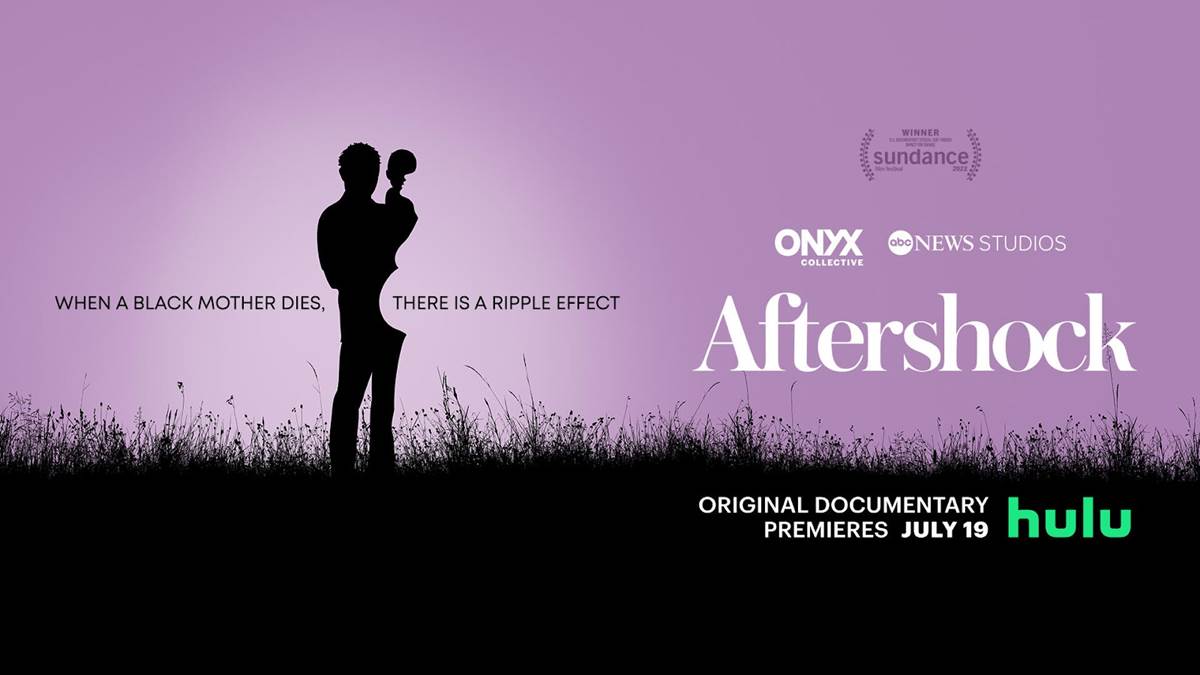Shamony Gibson. Amber Isaac. These are just two of the many women who have died in the maternal health crisis that is spotlighted in the new documentary Aftershock from Hulu. Black women comprise a smaller proportion of maternal deliveries but a higher number of maternal deaths in the United States.
The death of Shamony and Amber leave their families shattered. They looked forward to being a mom and raising their children with their partners, but their dreams ended tragically. The worst part is that their deaths were preventable.
Shamony’s partner Omari is left with two young kids, grieving the loss of his partner, and trying to make sense of the reality of the world he now lives in. The hole that is left in his heart, and the anger at his loss is directed at bringing attention to the crisis that has gone unnoticed. With Shamony’s mother Shawnee Benton-Gibson, the two look to make a difference.
We also meet Bruce Mcintyre who is in shock at the death of his partner Amber Issac. Omari comes to meet Bruce and they form a support group for other black men in the community who are experiencing similar circumstances. As we sit in on the group meetings the pain and anguish are real, and we start to learn the intolerable experiences that these men and their partners experienced.
While Aftershock focuses on these two families and their lives, the film goes further into the roots behind the crisis with a substantive deep dive into maternal mortality rates in the United States, and how it disproportionately affects black women. As we watch Omari and Bruce come together to help each other viewers will not only grieve with the men but be enraged by the treatment they have received from their health care providers.
The systemic racism that exists in how black people are treated in medicine is detailed at length in Aftershock. It’s real, it’s not imagined, and the statistics are shocking. As the movie dives further into the history of how black women were treated in the past from the days of slavery to the present, viewers will be alarmed and frightened by the senseless loss and the lack of care surrounding childbirth.
A rise in C-Sections, a rush to get birthing over as quickly as possible, or the fact that the health care system is so overtaxed and not properly funded, there are multiple reasons why the maternal health crisis is growing in America. As we follow the families in the film, we learn about the stigmas they face each day, the prejudice that exists, and a lack of connection with their doctors.
When Shamony gave birth to her child, it was a rushed affair, and when she experienced complications, her doctors paid no attention and ignored what she was saying. When the situation got out of control, and Shamony collapsed, one of the first questions that paramedics asked on arrival was if she was on drugs. The idea that the color of your skin determines your medical treatment is appalling, and Aftershock brings to life the reality that black people face every day. If you are black in America, you are treated differently than if you are white, and that could cost you your life.
While Omari, Shawnee, and Bruce unite to bring change, Aftershock also shows us Neel Shah, a doctor at Harvard who is working to reframe the process of birth. Dr. Shah meets with Omari and begins his own campaign to educate medical personnel about the experiences of black women during birth in hopes of avoiding the tragedies that Shamony and Amber experienced.
From the grassroots campaigns to the hospitals, Aftershock has a third act in a birthing center in Oklahoma. Here we follow Felicia and Paul Ellis who are going through their birthing plan but are afraid to go to the hospital because of the high death rates for black women in Tulsa during childbirth. At the birthing center, viewers get to see the serenity of birth through Felicia and Paul’s experience, which ends in happiness.
Aftershock is an eloquent and emotional experience through the eyes of black women and their families which highlights the lack of care they receive from health services at one of the most important medical moments of their lives. There is still a strong prevalence of racism in acute care, and the fact that black women account for a large percentage of the fatalities during maternal health is an epidemic that needs to be addressed. Viewers will be shaken by Aftershock. The deaths of Shamony and Amber are earthquakes in the lives of their families, hopefully the aftershock will bring growth and change for others.
Watch this film, learn the facts, listen to Omari and Bruce as they mourn their partners, get angry with Shawnee as she grieves her daughter, and make the change you need to see people not the stereotype.
Aftershock is a brilliant indictment on an epidemic that has long gone unnoticed.

